
International Journal for History, Culture and Modernity
Scope & Guideline
Illuminating the Path from History to Modernity
Introduction
Aims and Scopes
- Interdisciplinary Historical Analysis:
The journal encourages the integration of diverse methodologies from history, cultural studies, and social sciences to understand historical phenomena and their contemporary relevance. - Cultural Representations and Memory:
There is a strong emphasis on how cultural artifacts, narratives, and practices shape collective memory and identity, often exploring visual and textual representations across different periods. - Post-Colonial and Subaltern Studies:
A recurring theme involves examining colonial histories and the voices of marginalized groups, aiming to amplify subaltern perspectives and challenge dominant historical narratives. - Modernity and Its Discontents:
The journal frequently engages with the concept of modernity, questioning its implications and the transformations it brings to societal structures, identities, and cultural practices. - Critical Engagement with National Myths:
Explorations of national identity and myths play a crucial role, scrutinizing how these narratives are constructed, maintained, and challenged within historical contexts.
Trending and Emerging
- Visual Culture and Representation:
Recent publications increasingly focus on visual narratives, exploring how photography and other visual media shape historical understanding and cultural representation. - Subaltern Voices and Agency:
There is a growing emphasis on subaltern studies, particularly in understanding the agency of marginalized groups in historical narratives, reflecting a broader commitment to social justice in scholarship. - Historical Consciousness and Memory Studies:
Themes related to historical consciousness and the uses of the past have gained traction, exploring how societies remember and interpret their histories amidst contemporary challenges. - Intersections of Culture and Politics:
The journal is increasingly addressing the intersections between culture and political movements, examining how cultural practices influence and reflect political ideologies. - Global Perspectives on Modernity:
Emerging discussions are expanding the understanding of modernity beyond Eurocentric frameworks, incorporating diverse global perspectives and experiences.
Declining or Waning
- Traditional Historical Narratives:
There appears to be a decline in emphasis on conventional historical narratives that prioritize grand historical events over individual or localized experiences. - Eurocentric Perspectives:
The journal has gradually moved away from a predominantly Eurocentric viewpoint, reflecting a broader trend in academia towards inclusivity and global perspectives. - Static Interpretations of Modernity:
Earlier works that engaged with modernity in a static or uncritical manner are less common, suggesting a shift towards more dynamic and critical approaches to understanding modernity. - Limited Focus on Nationalism:
While nationalism has been a significant theme, recent publications indicate a waning interest in nationalism as an isolated topic, favoring instead discussions that integrate nationalism with broader cultural and historical contexts.
Similar Journals

Revista Tefros
Exploring Cultural Narratives, Empowering Academic DialogueRevista Tefros is a premier academic journal published by UNIV NACL RIO CUARTO and TALLER ETNOHISTORIA FRONTERA SUR, focusing on the interdisciplinary fields of social sciences and humanities with a particular emphasis on ethnography and cultural studies. Since its launch in 2005, this Open Access journal has provided an invaluable platform for researchers, professionals, and students to disseminate their findings and engage with innovative scholarship. With an ISSN of 1669-726X and an E-ISSN of 1667-9229, Revista Tefros invites contributions that explore diverse cultural narratives and social dynamics, thereby enriching the academic dialogue. The journal is dedicated to promoting accessibility in research publication, ensuring that valuable insights are available to a broader audience. As part of its commitment to excellence, the journal strives to uphold high standards of scholarship and aims to contribute meaningfully to the academic community in Argentina and beyond.

Images
Fostering Dialogue Through Visual RepresentationsImages, published by BRILL, serves as a significant academic platform within the realms of Cultural Studies, History, Religious Studies, and the Visual Arts and Performing Arts. With its ISSN 1871-7993 and E-ISSN 1871-8000, this journal is committed to providing a scholarly forum that engages with the complexities of visual representations and their impact on cultural narratives. Though it currently holds a Q4 category ranking across various fields, indicating room for growth, its presence in Scopus rankings showcases its contribution to the arts and humanities, positioning it as a unique voice in interdisciplinary discourse. The journal aims to publish innovative research that fosters dialogue among scholars, practitioners, and students interested in the intersections of visual culture and societal dynamics. Despite its non-open access status, Images remains a vital resource for those seeking to understand the intricate fabric of cultural expressions from historical and contemporary perspectives, offering insights that resonate across academic and artistic landscapes.
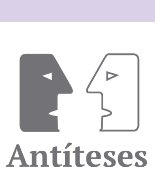
Antiteses
Advancing Scholarly Discourse Through Open AccessAntiteses is a distinguished academic journal published by UNIV ESTADUAL LONDRINA, serving as an indispensable platform for scholarly discourse in the humanities and social sciences. With an ISSN of 1984-3356 and an E-ISSN matching the same number, this peer-reviewed journal has embraced the Open Access model since 2008, ensuring that cutting-edge research is readily available to researchers, professionals, and students globally, thereby fostering an inclusive academic community. Antiteses aims to explore critical discourses across various domains, encouraging innovative thoughts and discussions that challenge conventional paradigms. Located in Londrina, Paraná, Brazil, the journal maintains its commitment to high academic standards, although specific metrics such as H-Index or impact factor remain to be established. Its open-access nature aligns with contemporary trends towards equitable access to knowledge, making it a vital resource for those invested in the evolution of academic thought.
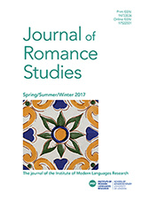
Journal of Romance Studies
Advancing Insights in Romance StudiesJournal of Romance Studies, published by Liverpool University Press, is a significant forum for scholarly discourse within the realms of cultural studies, linguistics, literature, and the visual and performing arts. With an ISSN of 1473-3536 and an E-ISSN of 1752-2331, this journal aims to bridge various interdisciplinary approaches, fostering insights into the richness of Romance languages and their cultural contexts. Although it holds a Q4 designation across several categories in the 2023 rankings, the journal continues to serve as a platform for emerging researchers and established scholars alike to contribute to the evolving narrative of Romance studies. Published annually, it ensures access to a diverse body of research that underpins the understanding and critique of Romance languages and cultures. Join a community committed to exploring these vital areas of inquiry, as the journal actively engages with contemporary issues shaping the landscape of Romance studies.

Journal of Belgian History-Revue Belge d Histoire Contemporaine-Belgisch Tijdschrift voor Nieuwste Geschiedenis
Navigating the Complexities of Belgium's PastThe Journal of Belgian History-Revue Belge d'Histoire Contemporaine-Belgisch Tijdschrift voor Nieuwste Geschiedenis is a prominent academic publication dedicated to the exploration and analysis of contemporary Belgian history. Published by SOMA-CEGES, this journal serves as a vital resource for researchers, professionals, and students alike, providing a platform for scholarly discourse and the dissemination of innovative research in the field. Despite its historical significance, the journal faced a hiatus in its Scopus coverage from 2019, yet it retains a strong identity within the Arts and Humanities category, holding a Scopus rank of #1123 out of 1328, placing it in the 15th percentile. This underscores the opportunities for growth and impactful contributions within the journal's scope. By focusing on the intricacies of Belgian history, the journal encourages rigorous investigation and a deeper understanding of Belgium's past, making it an essential reference for anyone interested in European historical narratives.
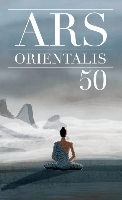
ARS Orientalis
Connecting Scholars Through the Lens of Visual CultureARS Orientalis is a distinguished academic journal published by the Smithsonian Institution's Freer Gallery of Art, specializing in the fields of archaeology, cultural studies, and the visual and performing arts. With an ISSN of 0571-1371, this journal contributes significantly to scholarly discourse, having established a robust timeline of publication since its inception, notably from 2001 to 2006, 2010 to 2012, 2014 to 2017, and resuming again from 2022 to 2023. Though currently not open access, it maintains a respectable standing in the academic community with a categorization into Q3 quartiles across several disciplines, highlighting its relevance amid rigorous scholarly evaluation. The journal is particularly valuable for researchers, professionals, and students who seek to explore interdisciplinary connections within its scope. Situated in the United States, it aims to disseminate insightful research that bridges the gap between traditional scholarship and contemporary studies in visual culture and archaeological findings.

Ukrainskyi Istorychnyi Zhurnal
Navigating the Socio-Political Evolution of UkraineUkrainskyi Istorychnyi Zhurnal is a prominent journal dedicated to the field of Ukrainian history, published by the National Academy of Sciences of Ukraine's Institute of History. With the ISSN 0130-5247 and E-ISSN 1729-570X, this journal serves as a vital platform for scholars and researchers to disseminate their findings, explore historical narratives, and engage in discussions pertaining to Ukraine's rich cultural heritage and historical complexities. Positioned as a leading resource in Eastern European studies, it aims to foster an understanding of the socio-political evolution of Ukraine from various perspectives. Although currently not available as an open access publication, Ukrainskyi Istorychnyi Zhurnal continues to make significant contributions to the historiographical discourse, helping readers navigate through the intricate layers of Ukraine’s past. Its commitment to rigorous academic standards and scholarly integrity makes it an essential reference for students, professionals, and historians alike.

Scandia
Fostering Innovative Research in Historical StudiesScandia is a distinguished academic journal dedicated to the field of history, published by SCANDIA in Sweden. With its origins dating back to 1976, the journal offers a platform for scholarly discourse, focusing on various historical perspectives and methodologies. Although currently not recognized as an Open Access journal, it fosters a rich exchange of ideas and original research, appealing to historians, researchers, and students alike. Operating within the Q4 quartile of its category for 2023, Scandia holds a significant position in the history landscape, ranking at #1627 out of 1760 in Scopus, representing the 7th percentile. With a commitment to quality scholarship, Scandia encourages contributions that challenge existing narratives and contribute to the broader understanding of historical contexts.
Please send your submissions or inquiries to the editorial office at Historiska Inst, Box 2074, Lund 220 02, Sweden.
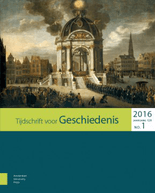
TIJDSCHRIFT VOOR GESCHIEDENIS
Fostering Dialogue on Historical InsightsTIJDSCHRIFT VOOR GESCHIEDENIS is a prestigious academic journal published by WOLTERS-NOORDHOFF B V, dedicated to the field of history. With its ISSN 0040-7518 and an established reputation in the Netherlands, this journal serves as a vital platform for researchers, professionals, and students to disseminate and engage with significant historical scholarship. The journal's impactful contributions have earned it a commendable Q2 category ranking in the history field for 2023, placing it in the top tier of history journals according to Scopus. Although not open access, TIJDSCHRIFT VOOR GESCHIEDENIS offers invaluable insights into various historical topics spanning from its converged years starting in 1983 through to 2024. This enduring commitment to scholarly excellence fosters robust academic discourse and acts as an essential resource for those engaged in historical studies.
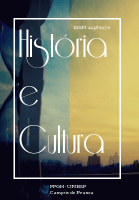
Historia e Cultura
Fostering Scholarly Exchange in the HumanitiesHistoria e Cultura is a distinguished open-access journal focusing on the dynamic and multifaceted exploration of history and culture within the context of the Humanities. Published by the UNIV ESTADUAL PAULISTA JULIO MESQUITA FILHO, FAC CIENCIAS HUMANAS & SOCIAIS, the journal serves as a vital resource for researchers, professionals, and students engaged in the fields of historical research and cultural studies. Since transitioning to open access in 2012, Historia e Cultura aims to democratize knowledge by providing free, unrestricted access to high-quality articles that foster scholarly exchange and innovation. Although the specific impact factor remains undisclosed, the journal is dedicated to contributing to the academic discourse through rigorous peer-reviewed research. Situated in Brazil, Historia e Cultura is well-positioned to address both local and global issues, encouraging critical engagement with cultural heritage and identity. Researchers and scholars are invited to submit their work, ensuring that diverse perspectives are represented in the study of our shared history.